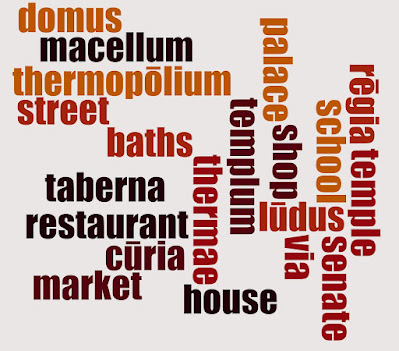appāreō, appārēre, appāruī [2]: appear
doceō, docēre, docuī [2]:
teach
habeō, habēre, habuī [2]:
have
moneō, monēre, monuī [2]:
warn
videō, vidēre, vīdī
[2]: see
____________________
audiō, audīre, audīvī
[4]: hear
mūniō, mūnīre, mūnīvī [4]:
fortify
sciō, scīre, scīvī [4]: know
sepeliō, sepelīre, sepelīvī
[4]: bury
aperiō, aperīrī, aperuī
[4]: open
veniō, venīre, vēnī
[4]: come
inveniō, invenīre, invēnī
[4]: find
There were a few posts
recently about the way in which Latin – most often through French – was brought
into the English language.
[i] habeō, habēre, habuī
[2]: have; that is not from Latin. Engl. ‘have’ is from Old English habban,
which can trace its Germanic ancestry back to Indo-European, which is also the
original source of the Latin verb.
[ii] Apart from habeō,
every one of those verbs above appears in English.
The most important first
step is to recognise meaning. Below are English words related to
those verbs:
- What part of a camera is the aperture?
- An inventor might … a solution to a problem.
- What does an advent calendar tell you?
- What is made in a munitions factory?
- What is the function of [i] audio equipment and [ii] video equipment?
- A dead body may be placed in a sepulchre.
- The word science is usually associated with, for example, Physics or Chemistry, but the original meaning of science had a far wider meaning.
- The word doctor now is most often associated with medicine, but, in Ancient Rome, doctōrēs were not doctors. What job did they do?
Even just a few letters can
‘trigger’ recognition: admonish i.e. caution; warn (moneō)
Verbs are the cornerstone of
a sentence; you may not know every word in a Latin sentence but go for the
verbs first. In the image match the verbs with their meanings.
- (Apollo) warned
- Apollo came
- Each of them gave [=had] a speech.
- He opened
- He taught (me)
- I buried
- I found
- I knew
- I saw
- Surely you’ve heard?
- The king heard
- They appeared
- They found
- They warned
- We all came
- We fortified
- We saw



